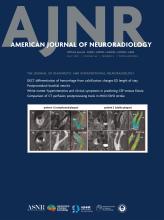Index by author
Youssef, Michael
- Brain Tumor ImagingYou have accessRepeatability and Reproducibility of Pseudocontinuous Arterial Spin-Labeling–Measured Brain Perfusion in Healthy Volunteers and Patients with GlioblastomaLimin Zhou, Durga Udayakumar, Yiming Wang, Marco C. Pinho, Benjamin C. Wagner, Michael Youssef, Joseph A. Maldjian and Ananth J. MadhuranthakamAmerican Journal of Neuroradiology May 2025, 46 (5) 973-982; DOI: https://doi.org/10.3174/ajnr.A8551
Zapaishchykova, Anna
- Artificial IntelligenceYou have accessEmpowering Data Sharing in Neuroscience: A Deep Learning Deidentification Method for Pediatric Brain MRIsAriana M. Familiar, Neda Khalili, Nastaran Khalili, Cassidy Schuman, Evan Grove, Karthik Viswanathan, Jakob Seidlitz, Aaron Alexander-Bloch, Anna Zapaishchykova, Benjamin H. Kann, Arastoo Vossough, Phillip B. Storm, Adam C. Resnick, Anahita Fathi Kazerooni and Ali NabavizadehAmerican Journal of Neuroradiology May 2025, 46 (5) 964-972; DOI: https://doi.org/10.3174/ajnr.A8581
Zarrintan, Armin
- NeurointerventionYou have accessStent Angioplasty for the Treatment of Cerebral Vasospasm: A Systematic Review and Meta-AnalysisJonathan Cortese, Esref Alperen Bayraktar, Sherief Ghozy, Armin Zarrintan, Cem Bilgin, Waleed Brinjikji, Ramanathan Kadirvel, Pervinder Bhogal and David F. KallmesAmerican Journal of Neuroradiology May 2025, 46 (5) 943-949; DOI: https://doi.org/10.3174/ajnr.A8617
Zhang, Dylan
- EDITOR'S CHOICEBrain Tumor ImagingYou have accessDevelopment and Evaluation of Automated Artificial Intelligence–Based Brain Tumor Response Assessment in Patients with GlioblastomaJikai Zhang, Dominic LaBella, Dylan Zhang, Jessica L. Houk, Jeffrey D. Rudie, Haotian Zou, Pranav Warman, Maciej A. Mazurowski and Evan CalabreseAmerican Journal of Neuroradiology May 2025, 46 (5) 990-998; DOI: https://doi.org/10.3174/ajnr.A8580
The goal of this study was to compare AI-based volumetric GBM MRI response assessment with standardized radiologist response assessments. The AI-based volumetric response assessment yielded overall moderate performance for recapitulating most human response assessment categories (BT-RADS 1, 2, and 4) but demonstrated the lowest performance for predicting BT-RADS 3, which is likely related to the high variability of this assessment. In comparison to radiologist assessment, the AI-based volumetric GBM MRI response assessment showed comparable performance for overall survival.
Zhang, Jikai
- EDITOR'S CHOICEBrain Tumor ImagingYou have accessDevelopment and Evaluation of Automated Artificial Intelligence–Based Brain Tumor Response Assessment in Patients with GlioblastomaJikai Zhang, Dominic LaBella, Dylan Zhang, Jessica L. Houk, Jeffrey D. Rudie, Haotian Zou, Pranav Warman, Maciej A. Mazurowski and Evan CalabreseAmerican Journal of Neuroradiology May 2025, 46 (5) 990-998; DOI: https://doi.org/10.3174/ajnr.A8580
The goal of this study was to compare AI-based volumetric GBM MRI response assessment with standardized radiologist response assessments. The AI-based volumetric response assessment yielded overall moderate performance for recapitulating most human response assessment categories (BT-RADS 1, 2, and 4) but demonstrated the lowest performance for predicting BT-RADS 3, which is likely related to the high variability of this assessment. In comparison to radiologist assessment, the AI-based volumetric GBM MRI response assessment showed comparable performance for overall survival.
Zhang, Zhonghe
- Pediatric NeuroimagingYou have accessMapping Fetal Brain Development of 10 Weeks’ Gestational Age with 9.4T Postmortem MRI and Histologic SectionsZhonghe Zhang, Yue Gao, Xiangtao Lin, Xue He, Ximing Wang and Shuwei LiuAmerican Journal of Neuroradiology May 2025, 46 (5) 1029-1035; DOI: https://doi.org/10.3174/ajnr.A8595
Zhou, Limin
- Brain Tumor ImagingYou have accessRepeatability and Reproducibility of Pseudocontinuous Arterial Spin-Labeling–Measured Brain Perfusion in Healthy Volunteers and Patients with GlioblastomaLimin Zhou, Durga Udayakumar, Yiming Wang, Marco C. Pinho, Benjamin C. Wagner, Michael Youssef, Joseph A. Maldjian and Ananth J. MadhuranthakamAmerican Journal of Neuroradiology May 2025, 46 (5) 973-982; DOI: https://doi.org/10.3174/ajnr.A8551
Zou, Haotian
- EDITOR'S CHOICEBrain Tumor ImagingYou have accessDevelopment and Evaluation of Automated Artificial Intelligence–Based Brain Tumor Response Assessment in Patients with GlioblastomaJikai Zhang, Dominic LaBella, Dylan Zhang, Jessica L. Houk, Jeffrey D. Rudie, Haotian Zou, Pranav Warman, Maciej A. Mazurowski and Evan CalabreseAmerican Journal of Neuroradiology May 2025, 46 (5) 990-998; DOI: https://doi.org/10.3174/ajnr.A8580
The goal of this study was to compare AI-based volumetric GBM MRI response assessment with standardized radiologist response assessments. The AI-based volumetric response assessment yielded overall moderate performance for recapitulating most human response assessment categories (BT-RADS 1, 2, and 4) but demonstrated the lowest performance for predicting BT-RADS 3, which is likely related to the high variability of this assessment. In comparison to radiologist assessment, the AI-based volumetric GBM MRI response assessment showed comparable performance for overall survival.








